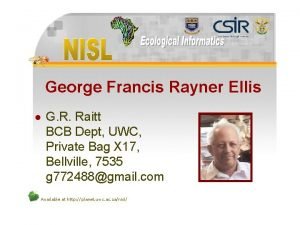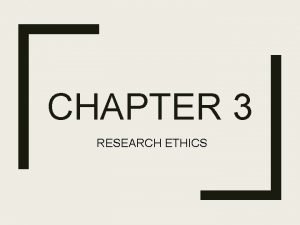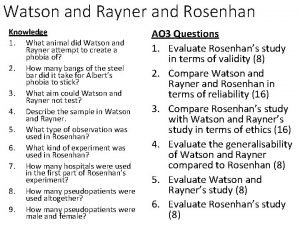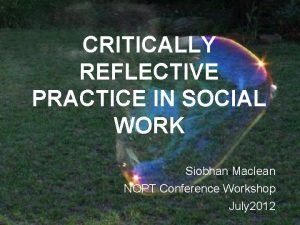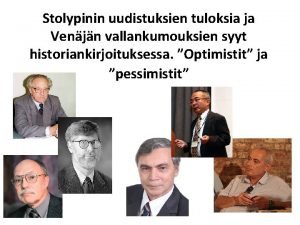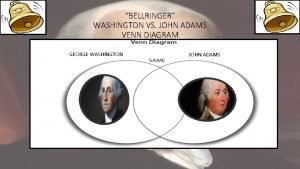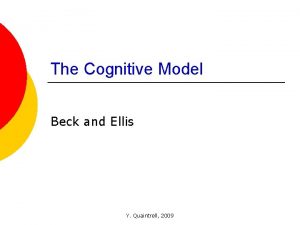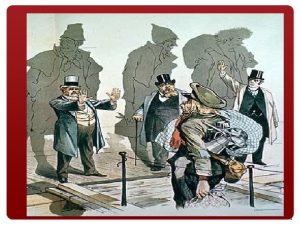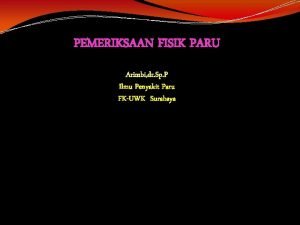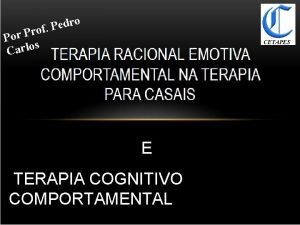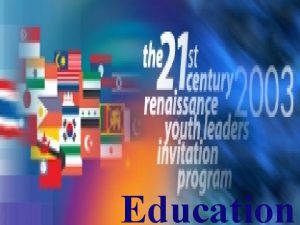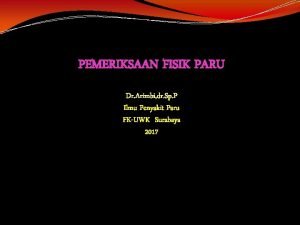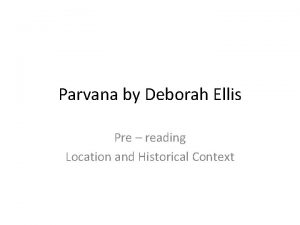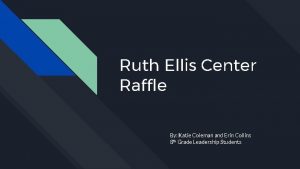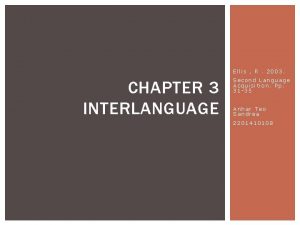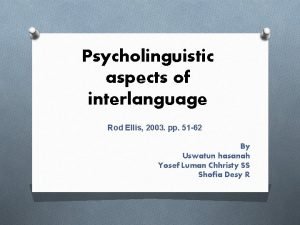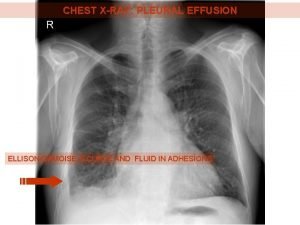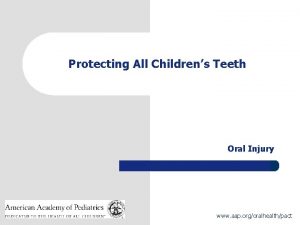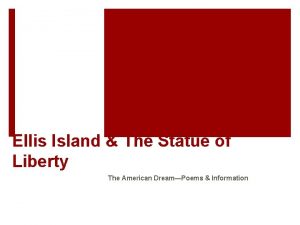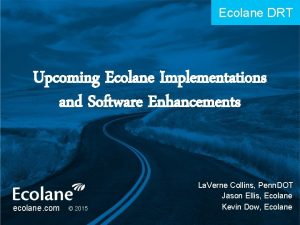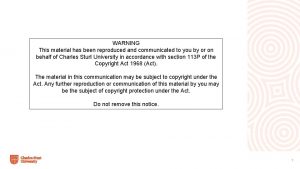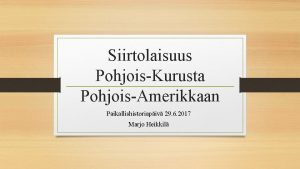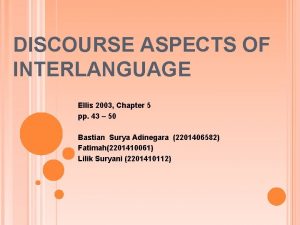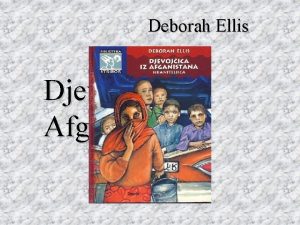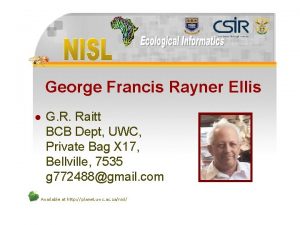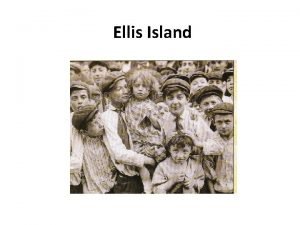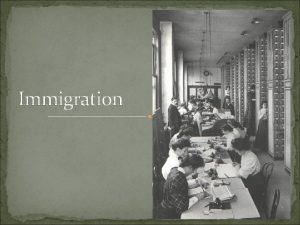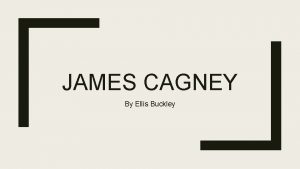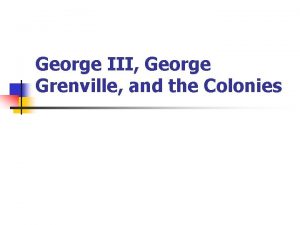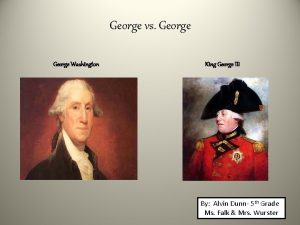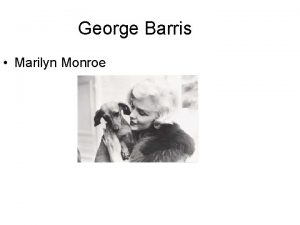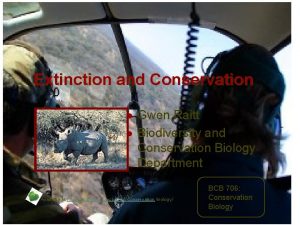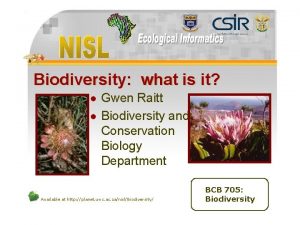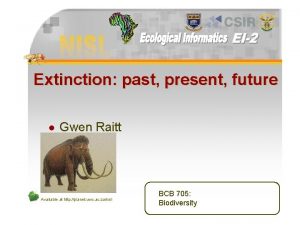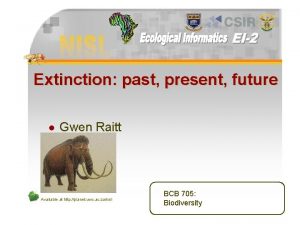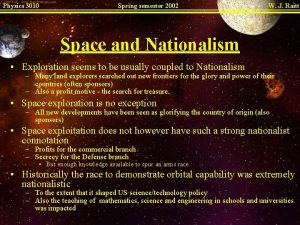George Francis Rayner Ellis l G R Raitt


![Birth q q q 11 August 1939[1] Johannesburg, South Africa[2] Parents: George Rayner Ellis Birth q q q 11 August 1939[1] Johannesburg, South Africa[2] Parents: George Rayner Ellis](https://slidetodoc.com/presentation_image_h/253bc46a9127a76907b225e75892f882/image-3.jpg)

![Ellis the Sportsman Represented UCT in fencing, rowing and flying[2] q On the St. Ellis the Sportsman Represented UCT in fencing, rowing and flying[2] q On the St.](https://slidetodoc.com/presentation_image_h/253bc46a9127a76907b225e75892f882/image-5.jpg)
![Ellis - Wandering Academic[2, 3, 6, 7] Ellis - Wandering Academic[2, 3, 6, 7]](https://slidetodoc.com/presentation_image_h/253bc46a9127a76907b225e75892f882/image-6.jpg)

![Quakers q q Founded in England in the mid 1600 s during Cromwell’s time[8]. Quakers q q Founded in England in the mid 1600 s during Cromwell’s time[8].](https://slidetodoc.com/presentation_image_h/253bc46a9127a76907b225e75892f882/image-8.jpg)
![Activism q q George Ellis was an anti-apartheid activist. [2] He co-authored ‘Low Income Activism q q George Ellis was an anti-apartheid activist. [2] He co-authored ‘Low Income](https://slidetodoc.com/presentation_image_h/253bc46a9127a76907b225e75892f882/image-9.jpg)






















![References q q 1. Wikipedia contributors. George Ellis [Internet]. Wikipedia, The Free Encyclopedia; 2007 References q q 1. Wikipedia contributors. George Ellis [Internet]. Wikipedia, The Free Encyclopedia; 2007](https://slidetodoc.com/presentation_image_h/253bc46a9127a76907b225e75892f882/image-32.jpg)

![References q q 8. Wikipedia contributors. Quaker history [Internet]. Wikipedia, The Free Encyclopedia; 2007 References q q 8. Wikipedia contributors. Quaker history [Internet]. Wikipedia, The Free Encyclopedia; 2007](https://slidetodoc.com/presentation_image_h/253bc46a9127a76907b225e75892f882/image-34.jpg)
![References q 12. Wikipedia contributors. Imre Lakatos [Internet]. Wikipedia, The Free Encyclopedia; 2007 May References q 12. Wikipedia contributors. Imre Lakatos [Internet]. Wikipedia, The Free Encyclopedia; 2007 May](https://slidetodoc.com/presentation_image_h/253bc46a9127a76907b225e75892f882/image-35.jpg)
- Slides: 35

George Francis Rayner Ellis l G. R. Raitt BCB Dept, UWC, Private Bag X 17, Bellville, 7535 g 772488@gmail. com Available at http: //planet. uwc. ac. za/nisl/

Objectives To learn something about George Ellis – a famous South African scientist. q To develop an understanding of the scientific method. q
![Birth q q q 11 August 19391 Johannesburg South Africa2 Parents George Rayner Ellis Birth q q q 11 August 1939[1] Johannesburg, South Africa[2] Parents: George Rayner Ellis](https://slidetodoc.com/presentation_image_h/253bc46a9127a76907b225e75892f882/image-3.jpg)
Birth q q q 11 August 1939[1] Johannesburg, South Africa[2] Parents: George Rayner Ellis and Gwendoline Hilda Mac. Robert Ellis[2]

Higher Education q q B. Sc. (Hons) and B. Com. (Hons) at the University of Cape Town (UCT)[3, 4] Ph. D. at the University of Cambridge in 1964 (at 25 years of age)[2, 4]
![Ellis the Sportsman Represented UCT in fencing rowing and flying2 q On the St Ellis the Sportsman Represented UCT in fencing, rowing and flying[2] q On the St.](https://slidetodoc.com/presentation_image_h/253bc46a9127a76907b225e75892f882/image-5.jpg)
Ellis the Sportsman Represented UCT in fencing, rowing and flying[2] q On the St. John’s College rowing team at Cambridge[2, 5]. q
![Ellis Wandering Academic2 3 6 7 Ellis - Wandering Academic[2, 3, 6, 7]](https://slidetodoc.com/presentation_image_h/253bc46a9127a76907b225e75892f882/image-6.jpg)
Ellis - Wandering Academic[2, 3, 6, 7]

Religion The Quaker egalitarianism contrasted strongly with Apartheid South Africa and attracted George Ellis. q He became a member of the Religious Society of Friends (Quakers) in 1974. [2] q
![Quakers q q Founded in England in the mid 1600 s during Cromwells time8 Quakers q q Founded in England in the mid 1600 s during Cromwell’s time[8].](https://slidetodoc.com/presentation_image_h/253bc46a9127a76907b225e75892f882/image-8.jpg)
Quakers q q Founded in England in the mid 1600 s during Cromwell’s time[8]. Do not believe in fixed statements of belief (creeds). Testimonies represent the principles Quakers live by. The four most common testimonies are peace, equality, integrity and simplicity[9].
![Activism q q George Ellis was an antiapartheid activist 2 He coauthored Low Income Activism q q George Ellis was an anti-apartheid activist. [2] He co-authored ‘Low Income](https://slidetodoc.com/presentation_image_h/253bc46a9127a76907b225e75892f882/image-9.jpg)
Activism q q George Ellis was an anti-apartheid activist. [2] He co-authored ‘Low Income Housing Policy in South Africa. ’[2, 3]

Awards q q q Various honoury degrees Various academic medals Star of South Africa Medal (1999) (see picture) Templeton Prize (2004) NSTF 2004 award for contributions to science and technology. Order of Mapungubwe (Silver) (2006)[3]

Ellis the Philanthropist q Ellis put half the Templeton Prize money into a trust fund which will be paid out to UCT after his death. q The other half of the prize money he gave away. The main beneficiaries were: q q q The Basic Income Grant Campaign The Association for Educational Transformation Quaker Organisations in South Africa. [4]

Ellis the Philanthropist q The minor beneficiaries of the Templeton Prize money were: q q The Michael Oak Waldorf School The Cape Town Life Training Centre of the Kairos Foundation q The African Summer Theory Institute q The Imagine Cape Town project q An agricultural high school in the area of Viljoenskroon, Free State. q Hurdy Gurdy House q Selected Individuals. [4]

Research q Cosmology q The history and philosophy of cosmology q Complex systems and the emergence of complexity q The human brain and behaviour q Science policy and developmental issues q Science and mathematics education q The relation of science to religion

Hierarchy of Sciences q q Arthur Peacocke proposed a hierarchy of sciences based on the increasing complexity of the entities studied. Murphy and Ellis present the following modified hierarchy. [10] Metaphysics (Theology) Ethics Cosmology Motivational Studies Astrophysics Social & Applied Sciences Geology, Ecology Psychology Biology Chemistry Physics

The hypothetico-deductive method Hypothesis Observation 1 Observation 2

First Exercise q Read the paper “Physics, complexity and causality” by George Ellis. q What is Ellis’ observation?

First Exercise Continued q What theory does this observation confound (disprove)? q How does Ellis show that theory is confounded (disproved)?

First Exercise Continued q How does Ellis modify theory to accommodate his observation?

Scientific Research Programmes q q q The traditional scientific testing (the hypotheticodeductive method) is only part of a scientific programme. Imre Lakatos set out the structure of a scientific research programme as follows: q The programme has a core theory that keeps it together by supplying a general view of the things under investigation. q The core theory is ‘protected’ by auxiliary hypotheses. q The auxiliary hypotheses are tested using the hypothetico-deductive method and modified accordingly. If the auxiliary hypothesis is altered just to avoid falsification, the change is said to be ‘ad hoc’ and is termed degenerative but if the change allows the prediction of a ‘novel’ (= new) fact it is termed progressive. [10, 12]

Evaluation of Scientific Programmes How does one choose between research programmes? q Lakatos recommends judging by whether the programme is progressive or degenerative (as previously defined for hypothesis adjustment ). [10, 12] q

Second Exercise q Answer each question before you move to the next slide. q Can Science explain everything?

Second Exercise Continued q George Ellis does not believe that science can explain everything. [10]

Second Exercise Continued q Give some examples of things that science cannot explain.

Second Exercise Continued q George Ellis believes that science cannot explain: q q thoughts and emotions though the brain physics and biochemistry can be understood. what caused the conditions that allowed the Hot Big Bang to occur. What the ultimate cause of everything is. [10]

Second Exercise Continued q What possible explanations are there for the initial conditions that allowed the ‘Hot Big Bang’?

Second Exercise Continued q q Murphy and Ellis list the following as possible explanations for the initial conditions of the ‘Hot Big Bang’. q Pure Chance q High Probability q Necessity q Universality q Intelligent Design q A combination of the above. Ellis reasons that both chance and design can act via the other ways so the choice boils down to chance or design. [10]

Second Exercise Continued q Can any of theories suggested to explain the initial conditions for the ‘Hot Big Bang’ be proved scientifically?

Second Exercise Continued q Ellis does not believe that theories can be proved scientifically. [10]

Second Exercise Continued q How would you decide between theories?

Second Exercise Continued q Ellis believes theories can be evaluated using Lakatos’ evaluation of scientific programmes. q The chance explanation does not lead to new facts but the metaphysics/theology explanation links with human behaviour. [10]

Final Exercise q Answer the following questions. q Does Ellis use the scientific method in the second exercise? Explain your answer. q Is the work of the second exercise science? Explain your answer.
![References q q 1 Wikipedia contributors George Ellis Internet Wikipedia The Free Encyclopedia 2007 References q q 1. Wikipedia contributors. George Ellis [Internet]. Wikipedia, The Free Encyclopedia; 2007](https://slidetodoc.com/presentation_image_h/253bc46a9127a76907b225e75892f882/image-32.jpg)
References q q 1. Wikipedia contributors. George Ellis [Internet]. Wikipedia, The Free Encyclopedia; 2007 May 4, 00: 10 UTC [cited 2007 May 10]. Available from: http: //en. wikipedia. org/w/index. php? title=George_Ellis&oldid=12809 4170. 2. Lehr, D. 2004 March 18. Professor George Ellis: a man of many parts. Cape Argus. Available from: http: //www. capeargus. co. za/index. php? f. Article. Id=377827. 3. Ellis, G. F. R. George F. R. Ellis [Internet]. Teaching and Research staff: Permanent and Long-term Contract, Maths Dept, UCT; Update Unknown but earliest 2006 [cited 2007 May 10]. Available from: http: //www. mth. uct. ac. za/~ellis/. 4. Ellis, G. F. R. Statement by George F. R. Ellis [Internet]. Templeton Prize News Conference (March 17, 2004); Updated 2004 March [cited 2007 May 16]. Available from: http: //speakingoffaith. publicradio. org/programs/scienceandhope/ell isstatement. shtml.

References q q q 5. Lehr, D. Current news: George Ellis wins 2004 Templeton Prize [Internet]. Templeton Prize, For Progress Toward Research or Discoveries about Spiritual Realities; Update 2004 March [cited 2007 May 10]. Available from: http: //www. templetonprize. org/news_templetonprize_2004. html. 6. Anonymous. Profile: Going Home, George Ellis [Internet]. The Abdus Salam International Centre for Theoretical Physics. Update Uncertain 2003 -2004 [Cited 2007 May 10]. Available from: http: //www. ictp. trieste. it/~sci_info/News_from_ICTP/News_107/profil e. html. 7. Anonymous. Presenters: George F. R. Ellis [Internet]. Nobel Conference 41 The Legacy of Einstein, September 27&28, 2005, Gustavus Adolphus College, Saint Peter, Minnesota USA; Updated 2007 [cited 2007 May 10]. Available from: http: //www. gustavus. edu/events/nobelconference/2005/? pr=present ers/ellis.
![References q q 8 Wikipedia contributors Quaker history Internet Wikipedia The Free Encyclopedia 2007 References q q 8. Wikipedia contributors. Quaker history [Internet]. Wikipedia, The Free Encyclopedia; 2007](https://slidetodoc.com/presentation_image_h/253bc46a9127a76907b225e75892f882/image-34.jpg)
References q q 8. Wikipedia contributors. Quaker history [Internet]. Wikipedia, The Free Encyclopedia; 2007 May 14, 07: 31 UTC [cited 2007 May 16]. Available from: http: //en. wikipedia. org/w/index. php? title=Quaker_history&oldid=130 728578. 9. Wikipedia contributors. Religious Society of Friends [Internet]. Wikipedia, The Free Encyclopedia; 2007 May 11, 13: 32 UTC [cited 2007 May 16]. Available from: http: //en. wikipedia. org/w/index. php? title=Religious_Society_of_Frie nds&oldid=130084163. 10. Murphy, N. C. , Ellis, G. F. R. 1996. On the Moral Nature of the Universe. Minneapolis: Fortress Press. 268 p. 0 -8006 -2983 -3 ISBN 11. Ellis, G. F. R. 2005. Physics, complexity and causality. Nature 435 (9 Jun. ): 743.
![References q 12 Wikipedia contributors Imre Lakatos Internet Wikipedia The Free Encyclopedia 2007 May References q 12. Wikipedia contributors. Imre Lakatos [Internet]. Wikipedia, The Free Encyclopedia; 2007 May](https://slidetodoc.com/presentation_image_h/253bc46a9127a76907b225e75892f882/image-35.jpg)
References q 12. Wikipedia contributors. Imre Lakatos [Internet]. Wikipedia, The Free Encyclopedia; 2007 May 5, 00: 09 UTC [cited 2007 May 18]. Available from: http: //en. wikipedia. org/w/index. php? title=Imre_Lakatos&oldid=1283 25765.
 Vic rayner wikipedia
Vic rayner wikipedia Little albert
Little albert Donna rayner
Donna rayner Watson and rayner
Watson and rayner Social work reflective practice models
Social work reflective practice models Kate rayner
Kate rayner Irina jusupova
Irina jusupova King george vs george washington
King george vs george washington Venn diagram ghent
Venn diagram ghent Ellis vs beck
Ellis vs beck Ellis irrationale glaubenssätze
Ellis irrationale glaubenssätze Ellis island vs angel island
Ellis island vs angel island Ellis island wedding
Ellis island wedding Sonor redup pekak timpani
Sonor redup pekak timpani Esquema abc de ellis
Esquema abc de ellis Lachlan ellis
Lachlan ellis Ben ellis teacher
Ben ellis teacher Ellis damoiseau line
Ellis damoiseau line Parvana deborah ellis
Parvana deborah ellis Ed ellis iowa pacific
Ed ellis iowa pacific Ruth ellis health and wellness center
Ruth ellis health and wellness center Ellis 2003
Ellis 2003 Ellis s shaped curve mechanism
Ellis s shaped curve mechanism Rod ellis 2003
Rod ellis 2003 Ellis curve in pleural effusion
Ellis curve in pleural effusion Ellis tooth fracture
Ellis tooth fracture Ellis island joseph bruchac
Ellis island joseph bruchac Jason ellis ecolane
Jason ellis ecolane Shopmart heaven
Shopmart heaven Cath ellis unsw
Cath ellis unsw Passiluettelot amerikkaan
Passiluettelot amerikkaan Jennie ellis australia immigration
Jennie ellis australia immigration Ellis 2003
Ellis 2003 Djevojčica iz afganistana: hraniteljica nooria
Djevojčica iz afganistana: hraniteljica nooria Ellis island inspection card
Ellis island inspection card Ellis 2003
Ellis 2003
